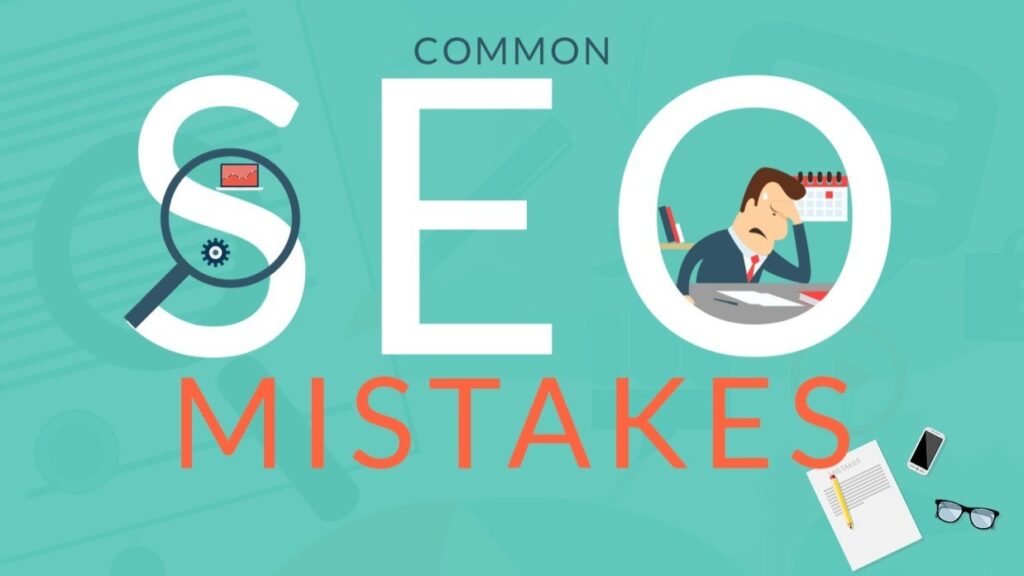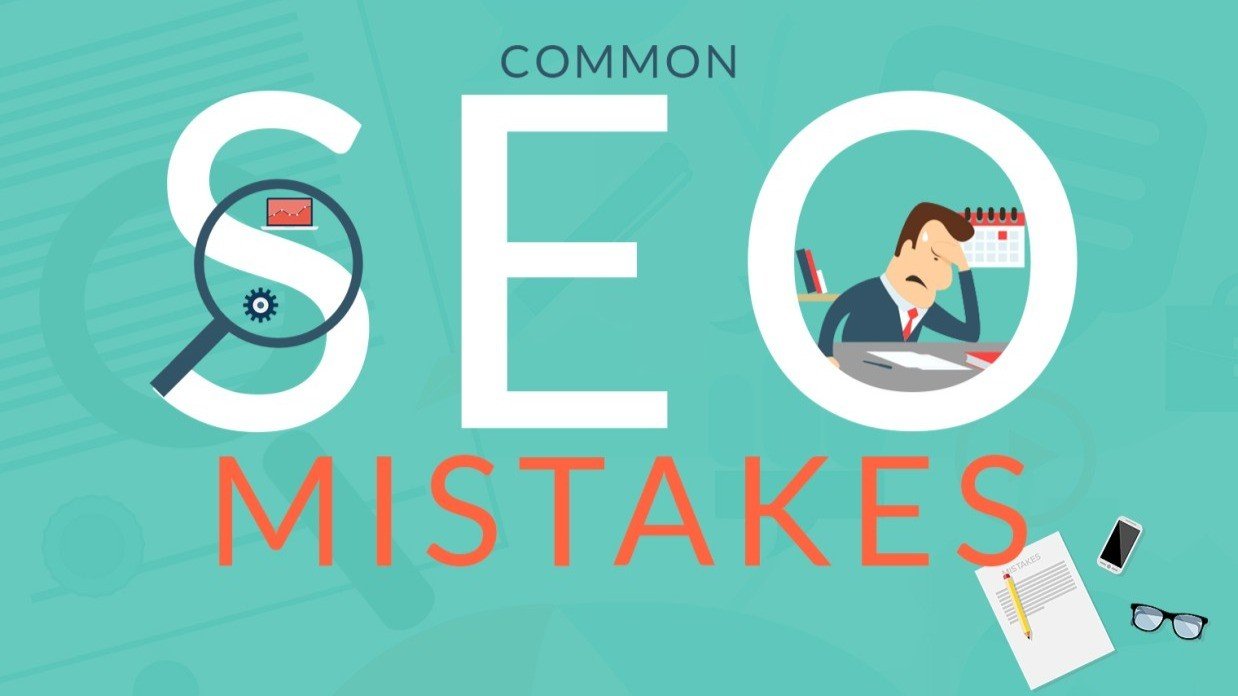Search Engine Optimization (SEO) can be a game-changer for small businesses, helping them attract the right audience without spending heavily on ads. However, most small businesses unknowingly make critical SEO mistakes that harm their rankings, traffic, and sales.
Most Common SEO Mistakes Small Businesses Make (And How to Avoid Them)

In this in-depth guide, we’ll uncover the most common SEO mistakes small businesses make, explain how to fix them, and share best practices for SEO success. We’ll also optimize this content for long-tail keywords and voice search, so you can learn in a practical, easy-to-understand way.
📉 Why Avoiding SEO Mistakes Matters for Small Businesses
Before diving into the specific errors, it’s crucial to understand why SEO mistakes hurt small businesses. Unlike big brands, small businesses often rely on organic traffic as a cost-effective way to compete. Just one SEO misstep can push your website to page two (or worse), where visibility drops drastically.
So, if you’re serious about showing up in Google’s top results, avoid these SEO mistakes that small businesses often make.
❌ 1. Ignoring Local SEO – A Common SEO Mistake for Small Businesses
If your business serves a local area, local SEO is not optional—it’s essential. Many small business owners forget to optimize for local searches like “bakery near me” or “best plumber in Brooklyn.”
✔️ How to Fix It:
Claim and optimize your Google Business Profile.
Add your city or neighborhood in title tags and meta descriptions.
Use local schema markup on your website.
Encourage happy customers to leave Google reviews.
➡️ Long-tail keyphrases to target:
“how to improve local SEO for small businesses”
“optimize small business website for local search”
⚠️ 2. Using the Wrong Keywords – A Major SEO Mistake Small Companies Make
One of the biggest SEO mistakes for small business websites is targeting broad or irrelevant keywords. Ranking for “shoes” is nearly impossible. But “affordable vegan running shoes in Austin” gives you a real shot.
✔️ How to Fix It:
Use tools like Ubersuggest, Ahrefs, or Google Keyword Planner.
Focus on long-tail keywords with low competition and high intent.
Think about how people ask questions (especially on voice search).
➡️ Pro tip: Voice search optimization means using natural language and question-based phrases.
📝 3. Not Having a Blog – A Costly Small Business SEO Mistake
Many small business websites are static. No blog. No fresh content. This is a huge missed opportunity! Without regular content updates, Google has no new reasons to rank your site.
✔️ How to Fix It:
Start a business blog and post helpful, keyword-rich content weekly.
Focus on customer pain points and questions.
Include internal links to your product or service pages.
➡️ Voice search keyphrase idea:
“what should small businesses blog about for SEO?”
🚀 4. Slow Website Speed – A Technical SEO Mistake Most Small Businesses Overlook
Let’s be real—no one waits 5 seconds for a website to load. Speed is a crucial ranking factor and impacts bounce rate, conversions, and overall user experience.
✔️ How to Fix It:
Compress images using tools like TinyPNG or ImageOptim.
Use a fast, reliable hosting provider.
Implement browser caching and enable lazy loading.
➡️ Keyphrase variation:
“how small businesses can improve website speed for SEO”
🔍 5. Missing Meta Descriptions and Title Tags – Basic SEO Mistakes Small Business Sites Make
Even today, many small business websites skip meta descriptions or write poor ones. These elements don’t just help with SEO—they’re your ad copy on Google!
✔️ How to Fix It:
Make each title tag unique, descriptive, and under 60 characters.
Write meta descriptions that include your keyphrase and call to action.
Ensure each page has one H1 heading, followed by logical H2s and H3s.
➡️ Keyphrase tip:
Use variations like “SEO title tag tips for small business websites.”
🛑 6. Not Optimizing for Mobile – A Costly SEO Mistake Small Business Owners Ignore
Over 60% of searches now happen on mobile. So if your site isn’t mobile-friendly, you’re probably losing customers.
✔️ How to Fix It:
Use a responsive design that works on all devices.
Test your site with Google’s Mobile-Friendly Test tool.
Ensure buttons and text are easy to tap and read on small screens.
➡️ Long-tail keyword idea:
“mobile SEO best practices for small business websites”
🔁 7. Forgetting Internal Links – One of the Most Overlooked SEO Mistakes by Small Businesses
Without internal links, Google can’t understand your site’s structure. It’s like a library with no signs. Users get lost, and so does your SEO.
✔️ How to Fix It:
Link related blog posts together using keyword-rich anchor text.
Make sure important pages are no more than three clicks from the homepage.
Add a related posts section to each blog article.
➡️ Voice search optimization idea:
“how to use internal links for small business SEO”
🧱 8. Thin or Duplicate Content – A Serious SEO Mistake for Small Business Owners
Google loves original, helpful, and in-depth content. Duplicate content—or shallow pages that say nothing useful—can pull your rankings down.
✔️ How to Fix It:
Write detailed, valuable content tailored to your audience.
Avoid copying content from competitors or manufacturers.
Use tools like Copyscape to check for duplicate content.
➡️ Keyphrase example:
“how to fix duplicate content SEO issues on small business sites”
🔐 9. No SSL Certificate – A Simple but Fatal SEO Mistake for Small Businesses
Google flags non-HTTPS sites as “Not Secure.” That scares visitors away and hurts your rankings.
✔️ How to Fix It:
Install an SSL certificate. Most hosts offer free ones.
Ensure all URLs redirect from http to https.
Update your sitemap in Google Search Console.
➡️ Long-tail keyword tip:
“how to install SSL certificate for small business website”
🧰 10. Not Using Google Tools – A Free SEO Advantage Many Small Businesses Miss
Free tools like Google Search Console and Google Analytics are SEO goldmines, yet many small businesses don’t use them.
✔️ How to Fix It:
Set up Google Search Console to monitor site health, fix errors, and track keyword rankings.
Use Google Analytics to understand user behavior and optimize conversion paths.
➡️ Related long-tail keyphrase:
“free SEO tools every small business should use”
✅ Final Thoughts: How Small Businesses Can Avoid Common SEO Mistakes
Now that you know the most common SEO mistakes small businesses make, you’re already ahead of most competitors. Here’s a quick checklist to keep your SEO on track:
🗒 SEO Mistake Prevention Checklist:
✅ Target long-tail keywords and voice search queries
✅ Optimize for mobile, speed, and local SEO
✅ Always add meta descriptions and unique title tags
✅ Use internal linking wisely
✅ Publish helpful, original content regularly
✅ Keep your site secure with HTTPS
✅ Monitor SEO performance using Google tools
By fixing these mistakes and following best practices, you can increase visibility, boost traffic, and grow your small business online—organically and effectively.
Top 20 FAQs (with answers) related to “Most Common SEO Mistakes Small Businesses Make
❓1. What are the most common SEO mistakes small businesses make?
Answer:
The most common SEO mistakes include ignoring local SEO, using wrong keywords, having slow websites, not blogging, skipping meta descriptions, lacking mobile optimization, and failing to build internal links.
❓2. Why is SEO important for small businesses?
Answer:
SEO helps small businesses rank higher on search engines, attract organic traffic, and reach potential customers without spending money on ads.
❓3. How do I avoid keyword mistakes in SEO?
Answer:
Avoid using broad or highly competitive keywords. Instead, focus on long-tail keywords that reflect user intent and match your services.
❓4. What is local SEO and why does it matter?
Answer:
Local SEO helps your business appear in location-based searches, like “dentist near me,” and is vital for attracting local customers.
❓5. How often should a small business update its website content?
Answer:
Update your website weekly through blogs or service updates. Fresh content tells Google your site is active and valuable.
❓6. What SEO tools should small businesses use?
Answer:
Use tools like Google Search Console, Google Analytics, Ubersuggest, SEMrush, Ahrefs, and Yoast SEO for WordPress.
❓7. How can I improve my website speed for better SEO?
Answer:
Compress images, use caching plugins, upgrade to faster hosting, and enable lazy loading to make your site load faster.
❓8. Is blogging necessary for small business SEO?
Answer:
Yes, blogging helps target long-tail keywords, builds trust, improves SEO rankings, and answers common customer questions.
❓9. How do I fix duplicate content on my website?
Answer:
Rewrite duplicate pages, use canonical tags, avoid copying manufacturer descriptions, and use tools like Copyscape to detect issues.
❓10. What’s the impact of not having mobile-friendly design?
Answer:
A non-mobile-friendly website leads to higher bounce rates, lower search rankings, and poor user experience on smartphones and tablets.
❓11. How do I optimize my website for voice search?
Answer:
Use conversational phrases, answer-based content, long-tail keywords, and structured data to align with how people speak their queries.
❓12. What’s an SSL certificate and why do I need it?
Answer:
An SSL certificate secures your website (HTTPS), builds customer trust, and improves search rankings since Google prefers secure sites.
❓13. How important are title tags and meta descriptions?
Answer:
Very important. Title tags help with SEO rankings, and meta descriptions improve click-through rates by summarizing your content in search results.
❓14. What are internal links and how do they help SEO?
Answer:
Internal links connect pages within your site, help Google crawl and understand your content, and keep users engaged longer.
❓15. Should I hire an SEO expert for my small business?
Answer:
If you lack time or knowledge, hiring an expert can fast-track results. However, with learning, many basics can be managed in-house.
❓16. How do I track my SEO performance?
Answer:
Use Google Analytics to track traffic and Google Search Console to monitor keyword rankings, indexing, and technical issues.
❓17. What are long-tail keywords and why use them?
Answer:
Long-tail keywords are specific phrases like “affordable pet grooming in Houston.” They attract targeted traffic with higher conversion potential.
❓18. How often should I check my SEO strategy?
Answer:
Review your SEO performance monthly. Adapt based on rankings, traffic, industry trends, and algorithm updates.
❓19. What happens if my website doesn’t rank on Google?
Answer:
You may miss out on organic traffic and leads. It likely means your site has technical issues, poor SEO, or irrelevant content.
❓20. Can social media help my SEO?
Answer:
Indirectly, yes. Sharing content on social media drives traffic, builds brand awareness, and increases the chances of getting backlinks.











